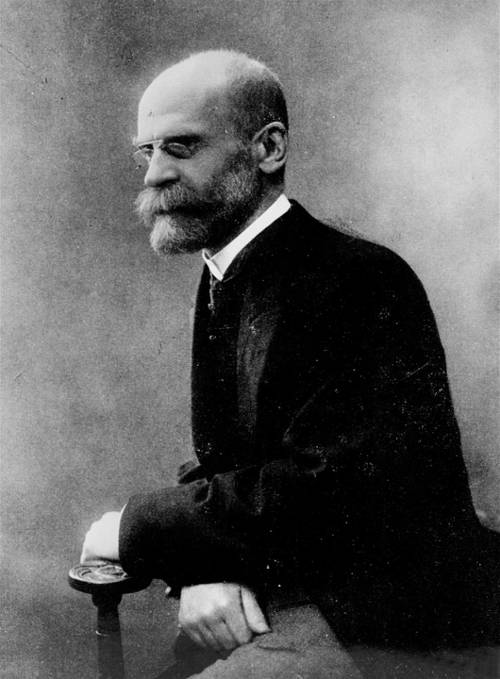
FAQ About Emile Durkheim

Who was Emile Durkheim?
Emile Durkheim was a French sociologist who is considered one of the principal architects of modern social science. Born in 1858, he was instrumental in establishing sociology as a formal academic discipline. Durkheim is renowned for his studies on how societies maintain their integrity and coherence in the modern era, which he explored through works like "The Division of Labour in Society," "Suicide," and "The Elementary Forms of the Religious Life."

What are Emile Durkheim's major works?
Emile Durkheim's major works include "The Division of Labour in Society" (1893), which explores how societal cohesion is maintained in various types of societies; "Rules of the Sociological Method" (1895), where he outlines his approach to sociology; "Suicide" (1897), a study on the social factors that influence suicide rates; and "The Elementary Forms of the Religious Life" (1912), where he examines religion's role in social life.

What is Emile Durkheim known for in sociology?
Emile Durkheim is known for his pioneering role in establishing sociology as a scientific discipline. He introduced key concepts such as social facts, anomie, and collective conscience. His work laid the groundwork for structural functionalism, emphasizing the role of institutions and social norms in maintaining societal stability and order.

What is the concept of 'social facts' proposed by Durkheim?
Emile Durkheim introduced the concept of 'social facts' as a way to analyze society. Social facts are values, cultural norms, and social structures that transcend individual preferences and impact our behavior. According to Durkheim, these are external to the individual yet exert control over individuals through established social mechanisms. Social facts can include laws, morals, beliefs, customs, etc.

How did Emile Durkheim define 'anomie'?
Durkheim defined 'anomie' as a state of normlessness, where societal norms fail to regulate the behaviors of individuals. This often occurs during periods of rapid social change or stress, where traditional norms become obsolete without being replaced by new ones. Anomie can lead to social instability and increased feelings of alienation in individuals.

What is Durkheim's theory on the division of labor?
In "The Division of Labour in Society," Durkheim theorized that social cohesion in complex societies is maintained through the division of labor. He argued that as societies grow and industrialize, they transition from 'mechanical' solidarity, based on similarities among individuals, to 'organic' solidarity, dependent on the interdependence of specialized roles. This division of labor promotes efficiency and social order but can also lead to feelings of isolation if not balanced with collective values.

What did Emile Durkheim study in his work on suicide?
In his seminal work "Suicide," Durkheim studied the social causes of suicide, proposing that suicide rates are influenced by the degree of integration and regulation within societies. He identified four types of suicide: egoistic (low social integration), altruistic (excessive integration), anomic (low regulation), and fatalistic (excessive regulation). These categorizations reflect the balance between individual needs and societal expectations.

How did Durkheim contribute to the understanding of religion in society?
Durkheim’s work "The Elementary Forms of the Religious Life" explores religion as a fundamental feature of social life. He argued that religious beliefs and practices bind people together, creating social cohesion. Durkheim believed that by studying the simplest forms of religion in indigenous cultures, insights could be gained into the nature of all religious life. He defined religion as a unified system of beliefs and practices relative to sacred things.

What is the significance of Durkheim's concept of 'collective conscience'?
The concept of 'collective conscience' refers to the set of shared beliefs, values, and attitudes of a society. According to Durkheim, the collective conscience acts as a unifying force that maintains social order by influencing individual actions and social norms. It is crucial for social cohesion, particularly in traditional and mechanical societies where homogeneity binds individuals together.

Why is Durkheim's work considered foundational in sociology?
Durkheim's work is considered foundational due to his rigorous scientific approach to sociology, introducing methodologies and theories that remain influential. His focus on empirical research, critical analysis of social phenomena, and development of key sociological concepts such as social facts and collective conscience established fundamental frameworks for studying societies in a structured and objective manner.

How did Durkheim's background influence his work in sociology?
Emile Durkheim’s background, growing up in a family of Jewish rabbis, influenced his interest in religion and moral values, which later became central themes in his work. His academic journey through philosophy and his exposure to contemporary social issues in France shaped his desire to analyze societal structures scientifically, thus pioneering new terrains in sociology.

What is the relationship between Durkheim's theories and modern sociology?
Durkheim's theories continue to influence modern sociology, particularly in how sociologists study the balance between individual freedoms and social constraints. Concepts like anomie and the division of labor are still used to analyze societal changes, job specialization, and cultural shifts in modern societies. His approach to studying the effects of societal structures on individual and group behavior remains a core aspect of sociological research.

How did Emile Durkheim impact the field of education?
Emile Durkheim had a significant impact on the field of education by applying sociological analysis to educational systems. He viewed education as a means of perpetuating the collective conscience, ensuring social cohesion by instilling shared norms and values in students. His belief in the role of education in shaping moral and social conduct has influenced educational philosophy and policy, especially concerning the integration of societal values within curricula.

What methodology did Durkheim use in his sociological studies?
Durkheim championed the use of empirical and statistical methods in sociological studies, advocating for sociology to stand as a distinct and scientific field. He emphasized that social phenomena should be treated as 'things' that can be studied objectively. Through this methodological approach, Durkheim was able to analyze social facts, integrating both quantitative and qualitative data to support his theories.

What were Durkheim's views on the transformation of societies?
Durkheim viewed society as evolving from simple, traditional structures to more complex, differentiated formations due to modernization and industrialization. He noted this evolution in his theory of the division of labor, observing that as societies progress, the nature of social solidarity shifts from mechanical to organic. This transformation affects how individuals interact and rely on each other, requiring new frameworks to maintain social cohesion.

How did Emile Durkheim address the balance between individual rights and social obligations?
Durkheim constantly explored the balance between individual rights and social obligations, believing that societal needs often outweigh individual desires to maintain social order. He argued that a society functions effectively when individuals are integrated within a framework of shared values and responsibilities, which helps manage the tension between personal freedoms and collective norms.

What role did morality play in Durkheim's sociological theories?
Morality was a central theme in Durkheim's sociological theories. He viewed moral norms as integral to social cohesion and as necessary guidance systems for individuals within society. According to Durkheim, education and religion are vital institutions for promoting collective moral values, preventing social fragmentation, and encouraging individuals to act in ways that benefit society as a whole.

Did Emile Durkheim address the role of law in society?
Yes, Emile Durkheim addressed the role of law in "The Division of Labour in Society," where he differentiated between repressive laws found in mechanical solidarity and restitutive laws associated with organic solidarity. He emphasized that the legal system reflects underlying social structures and helps maintain the balance between individual and collective interests, making law a cornerstone of social organization and regulation.

How does Durkheim's work help in understanding modern social problems?
Durkheim's work helps in understanding modern social problems by providing frameworks to analyze how societal structures and changes impact individuals and groups. His insights into anomie and social cohesion offer valuable perspectives on contemporary issues like social isolation, the effects of globalization, and the challenges in maintaining regulatory norms amidst rapid technological and cultural transformations.

Is Durkheim's theory of social integration still applicable today?
Durkheim's theory of social integration is still applicable today as it provides insights into how societies can achieve stability and cohesion even amid diversity and rapid change. By understanding the dynamics of integration and regulation, sociologists and policymakers can better address challenges like multiculturalism, social inequality, and the impacts of technological advancements on social life.
